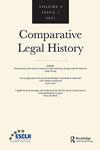帝国监禁:英属非洲殖民地时期未经审判的监禁
IF 0.5
Q2 LAW
引用次数: 1
摘要
事迹等等),只有通过与其他文献、其他收藏、其他日期的比较,才能对结构和过程进行分析性观察。将手册中的示例与档案中的示例进行比较是一回事;进行跨越时间和空间的大规模比较是另一回事。然而,这种比较需要档案查阅、语言熟练和分析敏锐。对于单个学者来说,这些要求是有限的。当作为合作的号召出现时,它们就变得解放了。《莫卧儿法律》的谈判为扩大合作提供了理由,因为它说明了与单个家族的藏品合作可以增加对不同帝国形式下法律运作的集体理解的深度、细节和复杂性。例如,只有通过提供跨地区和跨背景的全面了解的机会,学者才能向南亚历史的学生传达zamīndār的多重含义。想象一下,如果学者们不仅可以接触到一个家族的藏品,还可以接触到几个家族的藏品——不仅位于莫卧儿印度,而且位于整个波斯欧亚大陆和伊斯兰印度洋世界。由于可以访问扩展的数据集,对前现代法律和早期现代法律的理解可能会发生什么变化?这些文献收藏如何改变我们谈论欧洲帝国扩张历史及其伴随的文化遭遇的方式?我们如何通过向任何有互联网连接的人提供经过运输、移植、连根拔起和拆除的藏品,而不是依靠少数特权护照持有人的学术流动性,来挑战主导这些历史的殖民档案的重要性和中心性?《莫卧儿法律谈判》恳请我们提出这些问题,并邀请我们在思考法律的运作时考虑这些问题,不仅是从国家和帝国的角度,而且是从全球和相对的角度。本文章由计算机程序翻译,如有差异,请以英文原文为准。
Imperial incarceration: detention without trial in the making of British Colonial Africa
deeds and so on), it is only through comparison – with other documents, with other collections, with other dates – that analytical observations about structure and process become possible. To compare exemplars from manuals to examples from the archive is one thing; to engage in large-scale comparison across time and space is another. Yet such comparisons require archival access, linguistic adroitness and analytical acumen. For an individual scholar, these demands are limiting. When presented as a call for collaboration, they become liberating. Negotiating Mughal Law makes the case for expanding collaborative efforts by illustrating the depth, detail and complexity that working with a single family’s collection can add to collective understandings of law’s operations under varied imperial formations. For example, it is only by providing opportunities to see the full picture across regions and contexts that scholars will be able to communicate the multiple meanings of zamīndār to students of South Asian history. Imagine if scholars had access not just to a single family’s collection but to several families’ collections located not just in Mughal India but throughout Persianate Eurasia and the Islamicate Indian Ocean world. How might understandings of preand early modern law change as a result of having access to expanded data sets? How might these document collections change the way we talk about the history of European imperial expansion and its attendant cultural encounters? And how might we challenge the importance and centrality of the colonial archive that dominates these histories by making collections that have been transported, transplanted, uprooted and unmoored available to anyone with an internet connection, rather than relying on the scholarly mobility of a few privileged passport holders who can piece the collections together? These are the questions that Negotiating Mughal Law implores us to ask and invites us to consider as we think about the operation of law not only in terms of nations and empires but globally and comparatively as well.
求助全文
通过发布文献求助,成功后即可免费获取论文全文。
去求助
来源期刊
CiteScore
1.70
自引率
0.00%
发文量
20
期刊介绍:
Comparative Legal History is an international and comparative review of law and history. Articles will explore both ''internal'' legal history (doctrinal and disciplinary developments in the law) and ''external'' legal history (legal ideas and institutions in wider contexts). Rooted in the complexity of the various Western legal traditions worldwide, the journal will also investigate other laws and customs from around the globe. Comparisons may be either temporal or geographical and both legal and other law-like normative traditions will be considered. Scholarship on comparative and trans-national historiography, including trans-disciplinary approaches, is particularly welcome.

 求助内容:
求助内容: 应助结果提醒方式:
应助结果提醒方式:


